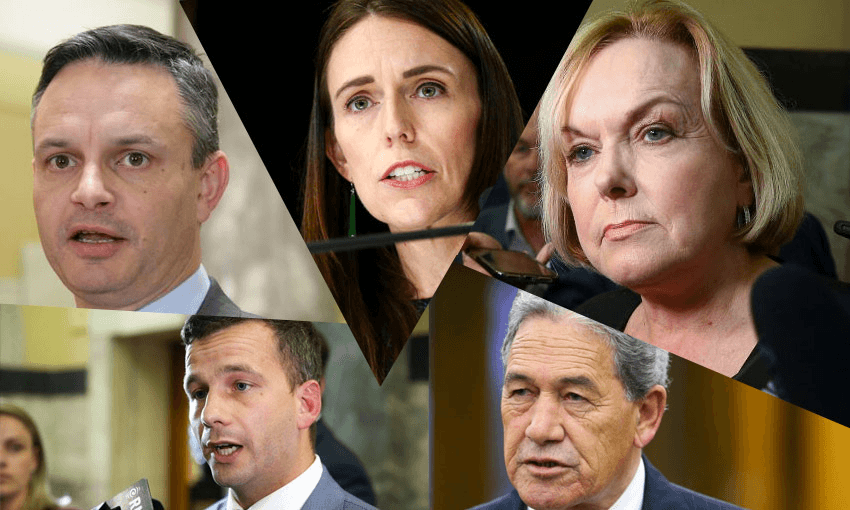Political leaders from the main parties gathered in Auckland today to address the business community and answer the question: ‘What is your party’s plan for economic growth?’ Here’s what they had to say.
As the leaders of five main parties gathered today, the results of a Deloitte and Chapman Tripp election survey revealed some telling figures:
Out of almost 1,200 business, only 19% believed the government had a coordinated plan of action to bring the economy out of Covid-19.
While most businesses surveyed thought the government had done a good or excellent job of handling the pandemic, the vast majority believed more needed to be done to reduce the regulatory burden on businesses in light of Covid-19, and most were not comfortable with government debt levels increasing to 53.6% of GDP by 2023.
Overwhelmingly, 86% felt that of all the government’s goals, economic welling should receive the highest priority.
So what would each leader do if they were re-elected? While they each had a lot to say, we picked a single highlight from each:
Jacinda Ardern
Today the prime minister doubled down on her government’s commitment to a Covid-19 elimination strategy that would use lockdowns as a last resort in the event of further outbreaks. The restrictions, she said, were the most effective way to allow huge parts of the economy to recover quickly.
“Ours is a response I will defend as being among the very best in the world, because not acknowledging that would be a disservice to five million new Zealanders who made it happen.
“There are of course no costless decisions in confronting a crisis such as this though. We’ve borrowed to cushion the blow.”
Among increasing the border quota for skilled workers and extending the small business loan scheme, a strategy to bring more overseas investment into New Zealand was a standout.
“We’ve a limited window of opportunity – our reputation and standing built over decades does make us an attractive home for companies and for investment right now.
“So we will launch an investment attraction strategy… and compete to win the global companies we want to invest in New Zealand and locate part of their business here.”
When asked by media if this would include more billionaire “doomsday preppers” who have developed a liking for New Zealand in recent years, the prime minister said all opportunities would be looked at if it brought a financial benefit to New Zealanders.
Judith Collins
The leader of the opposition started by opposing the prime minister’s stance, saying the yoyo-ing in and out of lockdown was the greatest impediment to economic recovery and was causing immense hardship to businesses.
While Collins had plenty to say in the realm of economic recovery, such as promising to put 80,000 electric vehicles on the New Zealand roads by 2023, a standout plan was to address the “mind-blowing stupidness” that restricted certain businesses and hindered economic performance in the event of future lockdowns.
“Let’s put essential industries aside. We should be looking at what’s a safe industry.
“Can anyone explain to me why a diary is allowed to open but the local butchers next door can’t? And the answer is because someone has decided that one is essential and the other’s not.”
James Shaw
Starting his address with a quip about the impossibility of eternal economic growth, the recently besieged Green Party co-leader talked about how much of the government’s economic stimulus through quantitative easing was simply going into the bank accounts of the already wealthy asset owners.
“Much of that is tax flowing from PAYE… from people who earn to people who own. I don’t think that it is unreasonable that the people who are benefiting from that expansion might be asked to chip in.”
Shaw’s standout economic growth policy was investing in clean tech: decarbonising the tourism market and transitioning to electric planes, boats and ferries to capitalise on a burgeoning and increasingly valuable industry.
“We do have a niche industry that’s starting to emerge here that I think we could encourage and grow.”
David Seymour
The Act leader immediately caught everyone’s attention when he called the government’s current run of spending and borrowing a form of “fiscal child abuse” because of the impact such a debt burden would have on future generations.
Seymour was adamant the government could not tax its way out of a recession, and instead pushed heavily for RMA reforms that would allow businesses and property owners to build and develop without the regulatory red tape.
“The problem is it’s impossible under our current regulatory environment to use your property and develop. So the difficulty we have is that so much of what people would naturally do is not happening because we’ve created a regulatory environment that is hostile to it.”
Winston Peters
“Don’t stuff the country!” the New Zealand First leader urged repeatedly via video link. “As we know, this country has a bad habit of distracting itself with woke issues.”
Peters had a lot to say about the shortcomings of the proposed Matariki holiday and James Shaw’s Green School, but his standout mechanism for encouraging economic growth was simply the handbrake New Zealand First would apply to the ideological extremism of the other parties.
“New Zealand First is standing on several platforms, one is the experience we bring to office and the moderating presence we have in government. And if you doubt that, just two words: capital gains tax.”
